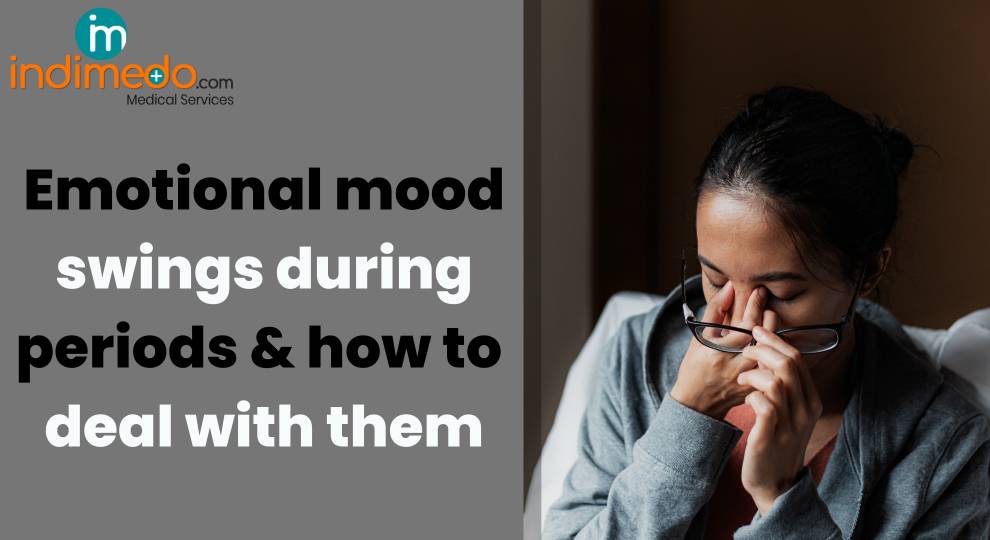Emotional mood swings during periods & how to deal with them.

Introduction
Mood swings during periods are a common experience for many people. Hormonal changes that occur during the periods can affect a person's mood, causing feelings of irritability, anxiety, and sadness. This is commonly known as premenstrual syndrome (PMS), and it typically occurs in the days leading up to a period.During a period, hormonal changes continue, and these can also affect mood. Some people may experience low mood swings or feelings of depression . while others may feel more emotional or easily overwhelmed. The severity of mood swings can vary from person to person, and some people may not experience them at all. There are several strategies that may help manage mood swings during periods, including getting regular exercise, getting enough sleep, eating a healthy diet, reducing stress, and avoiding alcohol and caffeine. In some cases, medication or therapy may also be helpful. If mood swings are severe or significantly impacting daily life, it is important to speak with a healthcare provider.
CAUSES OF MOOD SWINGS DURING PERIODS
Mood swings are a common experience for many pregnant people. Hormonal changes during pregnancy can affect brain chemicals that regulate mood, leading to emotional highs and lows. Here are some of the common causes of mood swings during periods:
- Hormonal changes: During pregnancy, the levels of oestrogen and progesterone increase significantly. These hormones can affect neurotransmitters in the brain, leading to mood changes.
- Physical discomfort: As the pregnancy progresses, physical discomfort such as nausea, fatigue, and back pain can affect mood and cause irritability or anxiety.
- Emotional stress: Pregnancy can be an emotionally stressful time, especially for first-time mothers. Concerns about the baby's health, financial worries, or relationship issues can contribute to mood swings.
- Lack of sleep: As the pregnancy progresses, it can become more difficult to find a comfortable position to sleep, leading to insomnia or restless sleep. Lack of sleep can contribute to mood swings.
- Changes in body image: As the body changes during pregnancy, some people may feel self-conscious or insecure about their appearance. This can lead to mood swings or depression
- Personal or family history of mood disorders: If you have a personal or family history of depression, anxiety, or bipolar disorder, you may be at a higher risk of experiencing mood swings during pregnancy.
Its important to talk to your healthcare provider if you are experiencing severe or persistent mood swings during pregnancy. They can provide guidance on managing symptoms and may refer you to a mental health professional if necessary.
SYMPTOMS OF MOOD SWINGS DURING PERIODS
Mood swings are common during a woman& menstrual cycle, particularly in the days leading up to and during her period. Some of the symptoms of mood swings during periods include:
- Irritability and anger: Women may feel easily frustrated, irritable, or angry during their periods. Small things that would not usually bother them may suddenly feel overwhelming.
- Anxiety: Women may experience feelings of worry, nervousness, and anxiety during their periods. This may be related to hormonal changes in the body.
- Depression: Some women may experience feelings of sadness, hopelessness, and depression during their periods. This is more likely to occur in women who have a history of depression.
- Mood swings: Women may feel like their moods are constantly changing during their periods. They may feel happy one minute and then suddenly become sad or angry the next.
- Fatigue: Women may feel more tired than usual during their periods, which can also contribute to mood swings.
- Difficulty concentrating: Women may find it harder to focus and concentrate during their periods. This can be related to changes in hormone levels.
It is important to note that these symptoms are normal and are not a cause for concern unless they are severe enough to interfere with daily life. If you are experiencing severe mood swings or other symptoms during your periods, it is recommended that you speak with your healthcare provider.
Menopause mood swings
Menopause is a time of significant hormonal changes in a woman&s body, which can cause a range of physical and emotional symptoms, including mood swings. Some of the symptoms of menopause mood swings may include:
- Irritability: Women may feel easily irritated or frustrated during menopause.
- Anxiety: Women may experience feelings of worry, nervousness, and anxiety during menopause. This may be related to hormonal changes in the body.
- Depression: Some women may experience feelings of sadness, hopelessness, and depression during menopause. This is more likely to occur in women who have a history of depression.
- Mood swings: Women may feel like their moods swing during menopause. They may feel happy one minute and then suddenly become sad or angry the next.
- Fatigue: Women may feel more tired than usual during menopause, which can also contribute to mood swings.
- Difficulty concentrating: Women may find it harder to focus and concentrate during menopause. This can be related to changes in hormone levels.
- Loss of interest in usual activities: Some women may experience a loss of interest in activities that they used to enjoy.
It is important to note that these symptoms are normal and are a natural part of the menopause transition. However, if mood swings are severe or interfere with daily life, it is recommended that women speak with their healthcare provider to discuss possible treatment options, such as hormone replacement therapy or other medications. Additionally, lifestyle changes, such as regular exercise, healthy eating, and stress reduction techniques, may also help alleviate mood swings during menopause.
PMS Mood swings
PMS (premenstrual syndrome) mood & swings & is a common condition that affects many women before their period. Mood swings are one of the most common symptoms of PMS. Some of the symptoms of PMS mood swings may include:
- Irritability and anger: Women may feel easily frustrated, irritable, or angry during PMS. Small things that would not usually bother them may suddenly feel overwhelming.
- Mood swings: Women may feel like their moods are constantly changing during PMS. They may feel happy one minute and then suddenly become sad or angry the next.
- Fatigue: Women may feel more tired than usual during PMS, which can also contribute to PMS mood swings.
- Difficulty concentrating: Women may find it harder to focus and concentrate during PMS. This can be related to changes in hormone levels.
- Bloating: Some women may experience bloating or fluid retention during PMS, which can also contribute to feelings of discomfort and mood swings.
It is important to note that these symptoms are normal and are not a cause for concern unless they are severe enough to interfere with daily life. If you are experiencing severe mood swings or other symptoms during PMS mood swings & it is recommended that you speak with your healthcare provider. There are various treatment options available, such as lifestyle changes, medication, and hormone therapy, that can help alleviate PMS-related mood swings and improve overall well being.
CONCLUSION
Mood swings are a common symptom that many people experience during their menstrual cycle. Hormonal fluctuations, particularly changes in levels of oestrogen and progesterone, can impact the brain chemistry and lead to changes in mood, energy, and emotions.During the menstrual cycle, oestrogen levels rise and fall, reaching their highest levels just before ovulation and then dropping rapidly after ovulation. Progesterone levels also rise after ovulation and then drop again just before menstruation.These hormonal changes can lead to a range of physical and emotional symptoms, including mood swings, irritability, anxiety, depression, and fatigue. The severity of these symptoms can vary from person to person and from cycle to cycle.If you are experiencing significant mood swings or other symptoms that are interfering with your daily life, it is important to talk to your healthcare provider. They may be able to recommend lifestyle changes, such as exercise or dietary modifications, or suggest medication or other treatments to help manage your symptoms.





 Login with Facebook
Login with Facebook
 Login with Google
Login with Google